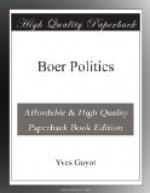The request was rejected by 14 votes to six. Four-and-twenty hours later the government passed a measure for an additional tax upon mining profits; then the Lombaard and Edgar cases occurred. The Chamber of Mines remained calm, notwithstanding.
4.—Timidity of the Chamber of Mines.
In his report of January 26th, 1899, Mr. Rouliot seems to have but one aim, and that is to dissociate the Chamber of Mines completely from the agitation excited among the English workmen by the murder of their comrade, Edgar, at the hands of policeman Jones. I quote his words:—
“The Chamber of Mines has never taken part in any political agitation, nor has it encouraged or organised demonstrations of a political nature. We take our stand solely upon an economic basis, endeavouring by constitutional means the alleviation of our burdens, and offering our advice upon questions that affect the State, equally with an industry, our thorough knowledge of which is undeniable. We ask neither for concessions, nor for monopoly. All that we ask is fair treatment for our business and our shareholders. I may here express my disappointment at seeing that all our efforts to bring about good feeling and union between ourselves and the executive, meet with nothing but contempt on the part of the latter.”
He then goes on to allude to Hollander officials; and possibly, to certain members of the diplomatic body:—
“Those act in
bad faith who unceasingly encourage the executive of
this country in their
retrograde policy, and constantly tell them
that all they do is
well done.”
He concludes by pointing out the manner in which the Press and political agents of the Government of Pretoria are stirring up ill-feeling against the proprietors and managers of mines. Persons without any defined profession, attracted by the vision of gold, have flocked to Johannesburg; unable to find employment, they have become a discontented proletariat. These are the true adventurers, if the word be taken in its worst sense. Mr. Krueger and his agents choose them as colleagues and pit them against the “wealthy metal-hearted mine owners.” This is the policy pursued by Dr. Leyds in Europe, where he has been clever enough to excite alike the capitalist and socialist Press against the hated mine owner.
Mr. Rouliot continues, that it is not within the province of the Chamber of Mines to provide work for incompetent workmen. It was, no doubt, from among these men that Mr. Krueger had raised the signatures of the counter-petition which so “emphatically” declared the administration of the South African Republic “to be all that could be desired.”
5.—The Petition and the Despatch of May 10th.
They were bona fide workmen who took the initiative in the petition of March 28th, 1899, called forth by the murder of their fellow-workman, Edgar. We see, from Mr. Rouliot’s report, that the Chamber of Mines regarding the petition as compromising, disassociated itself from it. Nor was that all. The President of the South African League in the Transvaal, Mr. W. John Wybergh, a consulting engineer by profession, was dismissed by one of the principal companies.




